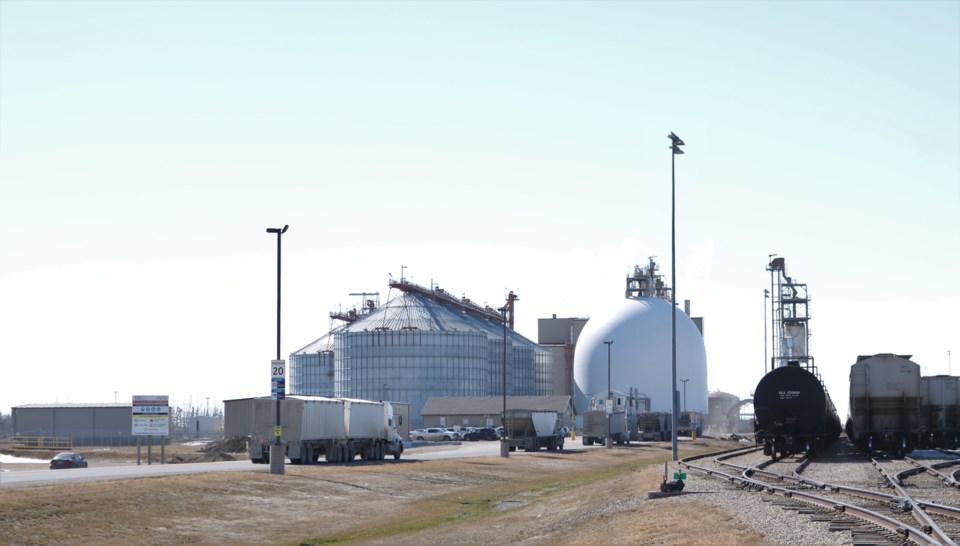YORKTON - Yorkton is once again the economic beneficiary of being a regional hub for agriculture.
Wednesday Louis Dreyfus Company’s (LDC) announced a new pea protein isolate production plant at the site of its existing industrial complex in Yorkton.
“It’s absolutely fantastic news,” said Yorkton Mayor Mitch Hippsley. “Are we excited, absolutely.”
LDC’s Country Manager for Canada Brian Conn said the development works into the company’s plan.
“Canada is a key market for LDC, supporting our strategic growth plans in the region and beyond, and this is reflected in the continued expansion of our origination and processing operations and activities in Saskatchewan, and Yorkton in particular,” he said via a provincial government release.
Construction of the new plant, which is expected to cost $500 million, is expected to begin later this year.
Hippsley said it is good to see a company with a footprint in the city expanding what it does here. He added in terms of agricultural processing Yorkton is well situated in terms of highway and rail access, and also water that is often essential, and those local attributes have helped attract developments such as the just announced pea plant.
The plant’s expected completion date is the end of 2025 and, once operational, LDC anticipates that it will employ approximately 60 people.
Hippsley said the new jobs are great news for Yorkton.
According to the government release the new facility will expand and accelerate LDC’s existing pea protein isolate and non-GMO soy isolate offerings, while delivering highly functional, taste-neutral and nutritious ingredients to customers.
“Pea protein isolate is typically produced from yellow peas grown in either North America or Europe. The creation of pea protein isolate happens through a basic food production process that involves removing the pea's outer shell and milling it into a flour,” according to www.gainful.com, which was confirmed by Carl Potts, Executive Director of the Saskatchewan Pulse Growers.
According to Potts in terms of Saskatchewan pea production “about 80 per cent is typically yellow peas.”
The new plant is certainly good news for the pea sector, which at present relies on export for about 80 per cent of sales, said Potts.
“We certainly have the pea production,” he said, adding the supply of peas now simply has a new domestic market.
“There’s lots of opportunity to supply peas in Saskatchewan.”
This new facility will expand and accelerate LDC’s existing pea protein isolate and non-GMO soy isolate offerings, while delivering highly functional, taste-neutral and nutritious ingredients to customers, noted the release.
The Government of Saskatchewan welcomed the LDC investment.
Trade and Export Development Minister Jeremy Harrison said in the release the decision to build the plant shows how Saskatchewan continues to be the best place to invest and do business.
“As we work to create even more opportunities and jobs, we are fortunate to have a strong partnership with LDC. Today’s announcement takes us one step closer to achieving our goal of processing 50 per cent of the pulse crops produced in Saskatchewan. This announcement is great news for the Yorkton community and pulse growers across the province,” he said.
This new facility, paired with other recent pulse processing announcements, puts the province on track to meet its pulse processing goal from Saskatchewan’s Growth Plan.
In addition to helping achieve the pulse crop processing goal, the expansion puts the province closer to meeting several other key goals outlined in Saskatchewan's Growth Plan, including:
*Grow private capital investment in Saskatchewan to $16 billion annually;
*Increase the value of exports by 50 per cent;
*Grow Saskatchewan's agri-food exports to $20 billion; and
*Increase agriculture value-added revenue to $10 billion.
Saskatchewan’s pulse production averages approximately four million tonnes annually, accounting for approximately 90 per cent of Canadian lentil exports and roughly 80 per cent of Canada’s pea exports. Crop rotations using nitrogen-fixing pulses contribute to making Saskatchewan’s carbon footprint for crop production significantly lower than the global weighted average among comparable jurisdictions.
In 2022, Saskatchewan’s agriculture industry posted a third consecutive year of record agri-food exports, with a total value of $18.5 billion. Dry peas and pea proteins accounted for 6.5 per cent of valued at $1.1 billion.

